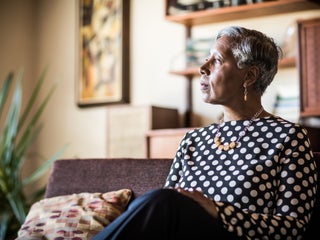Summary
What’s mine is yours. That’s often what’s written in marital vows, and while that may cover the snacks in your cabinet or the children you share, it doesn’t apply to your credit score. A credit score is a vital part of your financial health – it determines things like what…
The content on this page is accurate as of the posting date; however, some of our partner offers may have expired. Please review our list of best credit cards, or use our CardMatch™ tool to find cards matched to your needs.
What’s mine is yours. That’s often what’s written in marital vows, and while that may cover the snacks in your cabinet or the children you share, it doesn’t apply to your credit score.
A credit score is a vital part of your financial health – it determines things like what interest rates you get for a loan or the deposit you have to make to turn on utilities.
The days of depending on your spouse for total financial support are over. A strong independent financial foundation gives your family an added layer of security and you the peace of mind of knowing you’re covered.
See related: Financial advice: One size doesn’t fit all
Why women need their own credit
Women have come a long way
White women weren’t given the right to vote until 1920. And women of color were disenfranchised for decades after, not receiving the right to vote until many years later. Jump ahead to the 1970s and women still weren’t able to do many things without their husbands – like getting a birth control prescription or joining the military. It wasn’t until the Equal Credit Opportunity Act of 1974 that women were allowed to get a credit card without their husbands.
Every time we swipe our cards today, we don’t think that not that long ago, women didn’t have that option. Their money and financial identity were completely tied to their husbands. That doesn’t have to be the reality of 2021.
Now, we’re not saying joint bank accounts are bad, just that independent credit history is a good way to make sure you’re covered during unexpected life events.
Why is financial literacy so important for women?
Despite the fact that women have less credit card debt than men, women often have a lower credit score. Unfortunately, much of this comes down to the gender pay gap.
When you make less money, your debt-to-income ratio will naturally be higher because there is less income to work with. This means that creditworthiness drops, ultimately leading to a lower credit limit and a higher credit utilization ratio.
You should know that:
- Credit utilization ratio is also known as a balance-to-limit ratio. It compares the amount of credit being used to the total credit available to you. Experts agree you should keep this ratio as low as possible (since it makes up 30% of your credit score calculation). Credit utilization is the second most important factor in credit scoring calculations after making on-time payments.
- Creditworthiness is essentially how much the lender trusts you to actually pay off your debt. The higher your creditworthiness, the more favorable terms you’re going to get. If you’re not seen as creditworthy, you’ll likely get stuck with a high interest rate.
At the end of the day, women have to work harder and pay closer attention when trying to build a strong credit score. And financial independence can help you meet your goals – whatever they are.
Raya Reaves, women’s personal finance coach and founder of City Girl Savings, stresses the ripple effect that financial independence can have on all areas of a woman’s life.
“Financial independence puts the power back into the woman’s hands,” says Reaves. “She no longer has to stay in a bad relationship because she can’t afford to go anywhere else. She no longer has to stay at a dead-end job because she’s afraid she won’t be able to pay bills. She no longer has to turn down another vacation offer because she can’t pay for it.”
The stress of money troubles often lands on the shoulders of women, and the COVID-19 pandemic has made it even worse. According to a recent survey, 51% of women stress about their finances compared to only 41% of men. A strong credit score is one of the most important tools you have when it comes to financial hardship.
Why women need their own credit
The fact is, you need a credit score to do most things. Unless, of course, you have large sums of cash to pay upfront for your home or car.
A credit check is required for:
- Applying for a mortgage
- Getting a car loan
- Determining your insurance rate
- Getting a personal loan
- Renting an apartment
Sure, you can live without credit, but not easily. It would be a constant journey and often means you need more cash on hand to make deposits for things. If you manage to get a loan, it likely won’t come with favorable interest rates and you’ll end up paying more in the long run.
In some cases, a woman is listed as an authorized user on their partner’s credit card. While being an authorized user can help to build a credit history, your independence can be limited. Authorized users won’t receive bills and don’t have any control over the account. You cannot request changes to the credit line or add other authorized users – all decisions have to go through the primary account holder.
Bernadette Joy, founder of Crush Your Money Goals, knows firsthand the challenges that come with a lack of credit. Joy hadn’t used credit in some time when she purchased her home, so she had no credit score.
“It’s not that I’m bad with finances – it was quite the opposite,” Joy said. “I had no credit score because I put myself in a position to not rely on debt. I was still able to purchase the home, but I had to get the mortgage manually underwritten.”
How to build credit
Theoretically, building credit isn’t that difficult. It just requires a lot of upkeep and attention on your part.
- Get a credit card: A credit card is one of the most valuable tools in your arsenal. That said, there are a lot out there – reward cards, balance transfer credits, charge cards, student credit cards and more. Each card will offer different things. Secured credit cards, for example, are a good option to repair your credit or establish a score. It’s a good idea to do some research and find a card that fits your needs.
- Make your payments: It sounds obvious, but even one missed payment is going to set back your progress. Make sure you’re at least making your monthly minimum payments. If you can make additional payments, focus on paying down your largest balances to get down your credit utilization ratio.
- Keep an eye on your credit utilization ratio: You’ll want to keep this number as low as possible. For example, if your credit limit is $1,000, then keeping it under $300 at any time is favorable. That doesn’t mean you can’t make larger purchases, it just means that making larger payments to drop your balance back into a healthy range is advised. This will often mean making more than one payment a month.
- Review your credit report: Mistakes do happen. Carefully reviewing your credit report will allow you to catch any errors and dispute them.
Building credit, unfortunately, does take time, but it is well within any woman’s reach. Despite this, Bernadette Joy says that fear of failure is the most common barrier to women’s financial freedom.
“This is why it’s especially important for BIPOC women to become financially independent so that they can teach other women in ways that resonate despite the fear,” Joy says. “It’s not that I’m not afraid, I just take action anyway!”
See related: I signed up for Experian Boost. This is what happened
How far we need to go
Yes, Jane Fraser was recently named CEO of Citi, but there’s still a long way to go for women in finance – both in their careers and the tools they use to maintain their financial status.
Women, especially women of color, have been disproportionately negatively impacted by the pandemic through job loss and drops in hours. Which, in many cases, puts their financial security on the line and risks permanently halting their career.
After a series of viral tweets from men in the tech industry, Apple Card faced heavy criticism surrounding the fact that the algorithm discriminated against women by unfairly rewarding credit limits. They have since been cleared of wrongdoing, however, widespread financial gender discrimination still exists.
Women still earn less on average than men – 82 cents for every dollar a man makes to be exact. The pay gap gets even wider for women of color.
- Asian women make 89 cents for every dollar.*
- Black women earn 62 cents for every dollar.
- Native Hawaiian and other Pacific Islander women make 61 cents for every dollar.
- American Indian or Alaska Native women make 57 cents for every dollar.
- Hispanic women earn 54 cents for every dollar.
In addition to the pay gap, women pay more for gender-specific products – like razors, shampoo and tampons. This is called the pink tax. While it’s not actually a tax, it’s a phenomenon that describes the upcharge on products that are traditionally marketed toward women. It could be the exact same razor, but because it is in a pink or purple package, it’s slightly more expensive.
A number of organizations are doing the work to push complete equality across the board while empowering women to take charge of their finances and advocate for financial education.
If you want to get involved, considering becoming a part of their network, partner with your community and help raise money for the cause.
Programs to look for include:
- American Association of University Women
- Savvy Ladies
- Invest in Girls
- Women Employed
Bottom line
All that said, there are great strides being taken across the country to address these issues and propose solutions to inequality in finances and beyond.
As women continue to strive for equality, being financially independent is a valuable contribution to the fight. The two largest challenges Raya Reaves sees women face on their journey to financial independence are lack of knowledge and mindset. The good news, she says, is that both are completely within your control.
“When it comes to mindset, start by focusing on the positive. Be grateful for what is going well in your financial situation and start putting some key goals in place,” says Reaves.
And if you don’t know what steps to take, seek guidance. “There are books, podcasts, blogs and coaches out there that can help you get a plan in place. Don’t accept your situation for what it is.”
*Equal pay figures for this community vary widely by ethnicity.
Editorial Disclaimer
The editorial content on this page is based solely on the objective assessment of our writers and is not driven by advertising dollars. It has not been provided or commissioned by the credit card issuers. However, we may receive compensation when you click on links to products from our partners.



